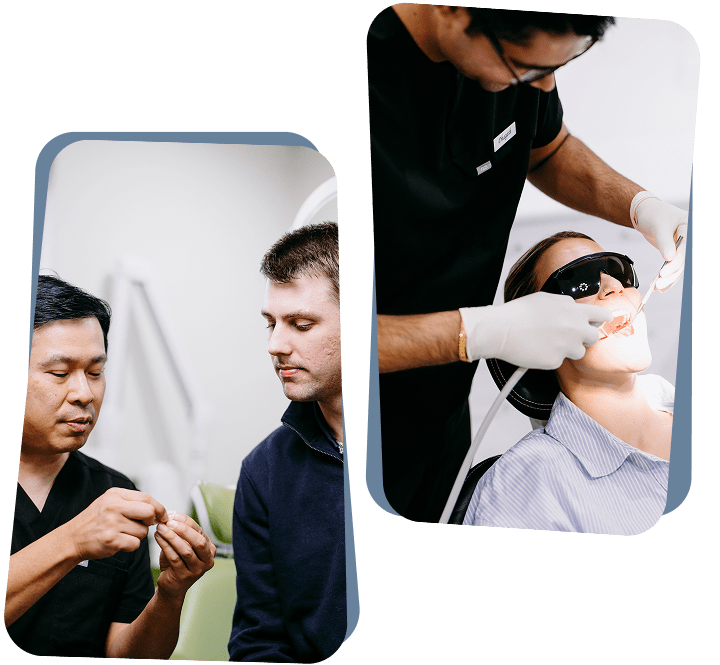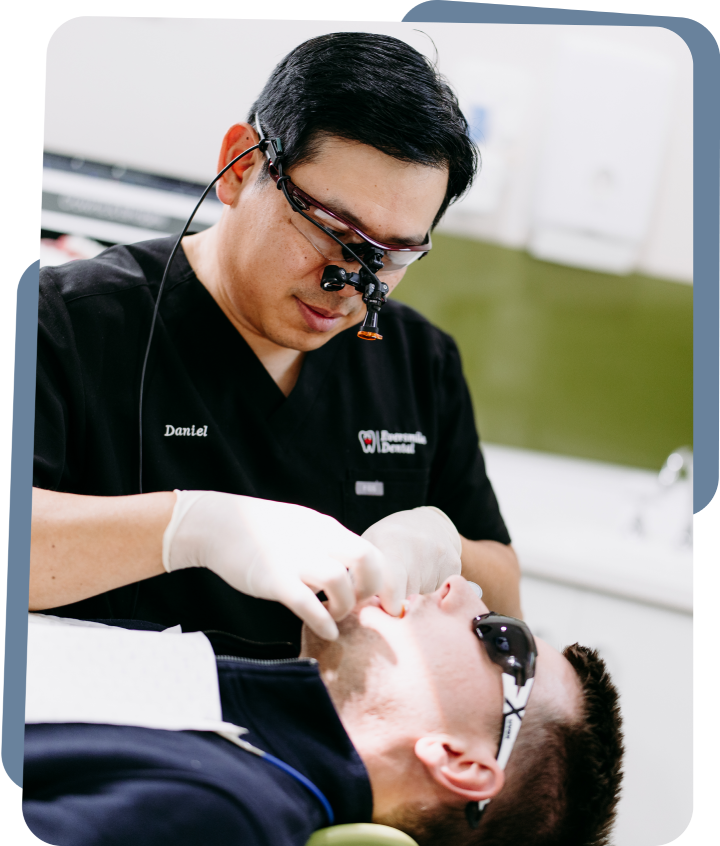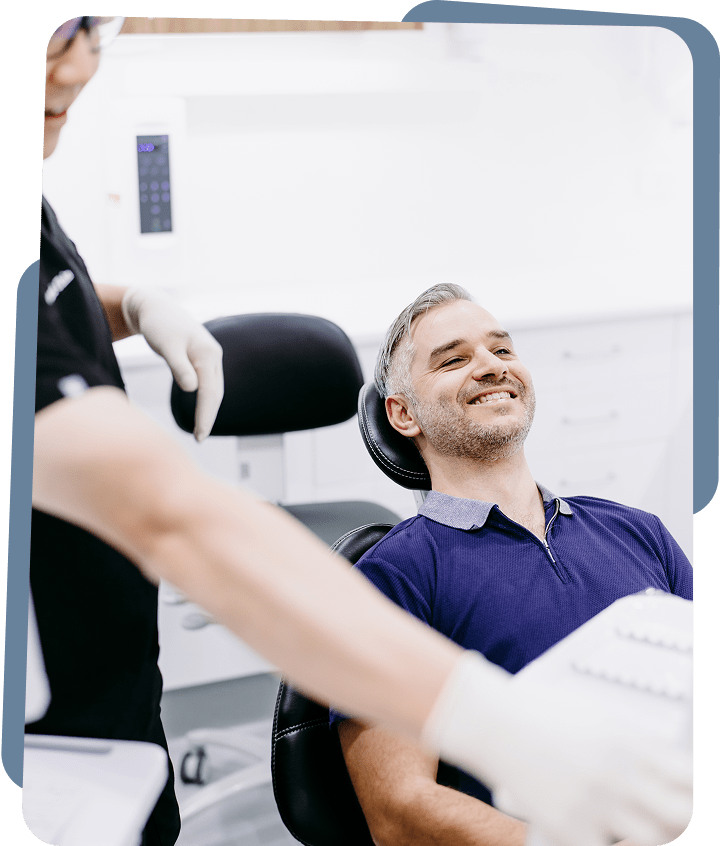Caring, Professional Dental Extractions
Tooth Extractions in Bunbury with a Considerate Approach

Why Tooth Extractions
Are Sometimes Necessary
for Oral Health
When Is a Tooth
Extraction Needed?
- Severe Decay
When a tooth is severely decayed, a dentist may recommend removal if restorative options, such as fillings or crowns, aren’t suitable. Extraction helps prevent infection and protects surrounding teeth from further complications.
- Impacted Tooth
An impacted tooth can press against adjacent teeth, causing discomfort. It may also lead to swelling or infection. The dentist may recommend removal when the tooth cannot emerge properly or affects surrounding structures.
- Advanced Gum Disease
Advanced gum disease damages the bone and tissue holding your teeth. If teeth become loose, your dentist may recommend removal. Removing affected teeth may help prevent further damage and support ongoing oral health.
- Tooth Crowding
Dentists may recommend tooth removal when severe overcrowding impacts jaw development or causes bite issues. Creating space may make orthodontic treatment more effective and prevent other dental concerns.


Health Benefits of Timely, Dentist-Guided Tooth Removal
- Pain Relief
Tooth extractions may help relieve ongoing pain caused by advanced decay, infection, or trauma. Dentists recommend removal when other treatments are unable to address the issue. Prompt action may help reduce the likelihood of complications and support oral health.
- Manage Infection Risk
Removing severely damaged teeth may help limit the spread of harmful bacteria to nearby teeth, gum tissues, or the jawbone. Timely removal can help reduce the risk of oral infection and maintain dental health under professional care.
- Preserve Tooth Alignment and Function
Dentists may extract compromised teeth that contribute to crowding, bite misalignment, or pressure on adjacent teeth. Removing these teeth can help maintain spacing and reduce unwanted movement, particularly during orthodontic treatment.
- Support Oral Health
Removing impacted or decayed teeth may improve access for cleaning, contributing to healthier gums and easier daily care. This can assist in maintaining comfort and stability within your bite over time.
Start with a Dental Consultation in Bunbury
Are you ready to prioritise your oral health? Book a consultation to discuss your oral health needs and treatment options.

Why Choose Eversmile Dental
-
- Proudly Bunbury Locals
- We don’t just work in Bunbury—we call it home. We raise our kids here, support local schools, and shop at the same weekend markets. We’re part of the fabric of this town, and we’re deeply connected with the people we serve. When you visit Eversmile Dental, you’ll be cared for by dentists who are part of the Bunbury community.
-
- Serving Since 2006
- Founded by Dr. Daniel Tham in 2006, Eversmile Dental has been part of Bunbury for nearly two decades, providing care for local families. We’re proud of our history and even more excited about where we’re heading as we continue caring for generations of local families.
-
- Dental Care for All Ages
- From a toddler’s first visit to helping grandparents maintain healthy gums, we tailor care for every age. We offer flexible appointment options and a supportive approach to make family visits easier. Our goal is to create a welcoming environment where dental care feels familiar and approachable.
-
- Personalised Care Plans for Your Needs
- You’re not just a number. At Eversmile Dental, we listen carefully, explain your options clearly, and work with you to create a plan that aligns with your goals. Whether you’re nervous, curious, or just want a second opinion, we’ll guide you with open communication and informed choices.
-
- Our Commitment to Professional Standards
- Honesty, integrity, and professional responsibility guide our care at Eversmile Dental. We clearly explain your treatment options and give you the opportunity to make informed choices without pressure. Our focus is on clear communication, professional advice, and delivering dental care in accordance with recognised standards.
-
- Modern Technology for Accuracy in Diagnosis and Treatment
- We’ve invested in modern dental technology, like 3D scanners, CBCT imaging, and EMS Airflow. Why? These tools assist with diagnosis and treatment planning in dental care.
Frequently Asked Questions
When is a tooth extraction necessary?
To help you understand when a tooth extraction may be necessary, we’ve listed the most common clinical reasons below. These reasons are carefully assessed to determine whether removal is right for your overall oral health. Extractions are considered when no other suitable options remain, and removal is most appropriate for the patient’s oral health.
- Extensive Tooth Decay:
A severely decayed tooth that can’t be restored with a filling or crown may need to be extracted. Removing the tooth may help reduce the risk of infection spreading and support the health of nearby teeth. - Advanced Gum Disease:
Advanced gum disease can damage supporting bone and tissue, causing the affected tooth to become loose over time. Extraction may help manage the condition and relieve associated discomfort. - Impacted or Problematic Wisdom Teeth:
Impacted or partially erupted wisdom teeth can cause pain, swelling, or infection in the area behind the molars. In such cases, removal may be recommended to alleviate discomfort and reduce the likelihood of future oral health problems. - Preparation for Orthodontic Treatment:
Patients undergoing orthodontic treatment may require one or more teeth to be removed to create space and help align their bite. This is typically recommended after careful assessment. - Severe Fractures or Trauma:
If a tooth is fractured below the gum line or badly damaged by trauma, it may not be restorable. In these cases, extraction may help manage pain, reduce inflammation, and lower the risk of further oral complications. - Severe Infection or Abscess:
When an infection spreads beyond the tooth and can’t be addressed with root canal therapy, extraction may be required. In some cases, extraction may be required to help manage infection and minimise the risk of further spread.
Each situation is unique, and we will clearly explain your options so you can decide on the most suitable treatment. If you’re unsure whether a tooth needs to be removed, book a consultation with our friendly dental team. We’ll guide you through your options and support you in choosing the most appropriate treatment for your oral health.
Is getting a tooth pulled painful?
We understand some patients feel concerned about tooth extractions. At Eversmile Dental, we use local anaesthesia and provide clear information so you know what to expect before, during, and after the procedure.
Before the Extraction:
- We will thoroughly assess the tooth and surrounding area using advanced digital imaging (CBCT) scans to determine the most appropriate approach. These scans provide detailed views of the bone, roots, and nerves, enabling more accurate planning and the appropriate management of extractions.
- You’ll have the opportunity to ask questions, raise concerns, and understand the treatment plan before it begins.
- A local anaesthetic will be administered to numb the area, so most patients do not feel pain during the procedure, though pressure or movement may be felt.
- For patients feeling anxious, sedation options can be discussed when appropriate. Calming strategies, such as music, guided breathing, or a quiet setting, may also assist in creating a more comfortable experience.
During the Extraction:
- Once the area is completely numb, we will carefully remove the tooth using dental instruments such as elevators and forceps.
- You may feel some pressure or movement, but for most patients, sharp pain is uncommon once the anaesthesia is effective.
- We’ll talk you through each step as it happens, so you always know what to expect.
- If the tooth is impacted, we may use a minor surgical technique involving a small incision in the gum. The tooth is sectioned into smaller pieces for easier and more controlled removal. Throughout the procedure, our team will aim to maintain clear communication and take measures to support patient comfort.
After the Extraction:
- You’ll be given clear aftercare instructions to help reduce swelling, manage discomfort, and promote healthy healing.
- Mild soreness or sensitivity in the area is normal for a few days after extraction. This is usually manageable with over-the-counter pain relief.
- We’ll advise you on how to avoid dry sockets and other complications, including guidance on diet, hygiene, and rest.
- Our team is just a phone call away if you have questions or experience anything unexpected.
We understand that the idea of getting a tooth pulled can feel overwhelming or stressful for some patients. Our team explains each step clearly and provides anaesthesia to help manage discomfort where appropriate, so you remain informed throughout your care.
What’s the difference between a simple and a surgical extraction?
We provide simple and surgical extractions depending on your dental condition. Both procedures are clinically recognised and differ in technique, complexity, and recovery. The comparison below outlines the general distinctions between these treatment types.
| Aspect | Simple Extraction | Surgical Extraction |
| Tooth visibility | • Tooth is fully erupted • Clearly visible above the gum line • Easily accessible for removal | • Tooth is impacted or partially erupted • May be beneath gum or bone • Often not visible externally |
| Procedure steps | • Tooth loosened with an elevator instrument • Removed using forceps • No incision required | • Small incision made in the gum • Tooth may be sectioned for removal • Bone may be trimmed if needed |
| Anaesthesia | • Local anaesthetic only • Quick and commonly used • Sedation is rarely needed | • Local anaesthetic used • Sedation is available if appropriate • Procedure duration may be longer |
| Healing & care | • Shorter recovery time • Minimal post-op discomfort • Fewer aftercare needs | • May involve swelling or bruising • Longer healing period • Detailed aftercare instructions provided |
| When it’s needed | • Severely decayed or loose teeth • Teeth removed for orthodontics • Non-complicated cases | • Impacted wisdom teeth • Broken or curved roots • Teeth trapped under gum or bone |
We’ll discuss which extraction type is most appropriate for you after a thorough assessment. At Eversmile Dental, we offer tooth extractions in Bunbury and explain the procedure, possible risks, and aftercare to help you make an informed choice.
Can I get a tooth pulled without anaesthesia?
Anaesthesia is generally recommended to help make the tooth extraction process more comfortable. While technically possible, removing a tooth without anaesthetic can be painful and is generally discouraged. Local anaesthetic numbs the area, so you feel pressure but not sharp pain during the procedure. We prioritise your well-being and will always explain your options before starting treatment.
Our team uses evidence-based techniques and approved anaesthetics and can discuss sedation options for anxious or sensitive patients. Choosing to avoid anaesthesia is rare and typically discouraged, especially for more complex extractions. If you have concerns, we’ll explain your options clearly and help you understand what to expect throughout the process.
How long does it take to recover from a tooth extraction?
Tooth extraction recovery varies based on the procedure type and how closely you follow your dentist’s aftercare instructions. At our dental clinic, we provide guidance throughout recovery to support proper healing. Here are the key stages of tooth extraction recovery and what you can expect during the healing process.
- Initial Relief Within 48–72 Hours:
Most patients feel a noticeable reduction in discomfort within two to three days after a simple tooth extraction. - Tissue Healing Takes One to Two Weeks:
The soft gum tissue around the extraction site heals within one to two weeks. Healing time can vary based on your oral hygiene and overall health. - Surgical Extractions May Take Longer:
If you’ve had a surgical extraction, recovery may take longer than a simple extraction. Swelling and tenderness usually subside within 7–10 days. - Bone Healing Takes Several Weeks:
The gums may heal quickly, often within 1 to 2 weeks after the extraction. However, the bone and deeper tissues may take several weeks or months to stabilise fully, especially before placing an implant. - Following Aftercare Speeds up Healing:
Following aftercare instructions can support recovery and lower the risk of complications after a tooth extraction. Eating soft foods and avoiding irritation at the site can also reduce the risk of complications such as dry sockets. - Know When to Contact Us:
If you notice increased pain, swelling, or other signs after a few days, please contact our team. We’ll assess your recovery and provide any additional care needed to assist with your healing.
Your recovery experience is unique, and we’re available to monitor your progress and address any concerns that may arise.
How long will my face be swollen?
Swelling after a tooth extraction is common and peaks within the first 48 hours following your procedure. Most patients notice that the swelling gradually reduces over three to five days, depending on the complexity of the extraction. Using a cold compress during the first 24 hours can help minimise swelling and discomfort. We’ll provide you with tailored aftercare instructions to support comfortable and steady healing.
In cases involving surgical extractions or impacted wisdom teeth, swelling may persist slightly longer, typically lasting up to seven days. It’s important to avoid smoking, strenuous activity, or hot foods during this period, as they can worsen swelling. If swelling increases after three days or is accompanied by fever, please contact our team promptly. We’re available to assess your recovery and discuss any concerns you may have.
Can I brush my teeth 24 hours after a tooth extraction?
Yes, you can gently brush your teeth 24 hours after a tooth extraction, but avoid the extraction site directly. Gently clean the surrounding teeth using a soft-bristle toothbrush. Avoid vigorous rinsing or brushing near the socket for several days to reduce the risk of a dry socket. Keeping the rest of your mouth clean helps support healing and reduces the risk of infection.
We recommend using lukewarm saltwater rinses after 24 hours to help keep the area clean and prevent infection. Avoid commercial mouthwashes unless recommended, as they may irritate the healing site. Our team will provide specific aftercare instructions suited to your extraction type and individual needs..
What should I avoid after a tooth extraction?
If you’ve recently had a tooth removed, following the right aftercare advice can make all the difference in your recovery. Here’s what we recommend you avoid to support healing:
- Avoid smoking or vaping for at least 72 hours after your extraction. Tobacco use is associated with delayed healing and a higher risk of complications such as dry sockets.
- Do not rinse your mouth vigorously on the first day, as this can dislodge the blood clot.
- Avoid using straws or spitting forcefully, as this can disturb the blood clot that forms in the socket.
- Avoid touching the extraction site with your tongue, fingers, or objects, as this can introduce harmful bacteria. Disrupting the site may interfere with healing and could lead to avoidable discomfort or irritation.
- Avoid consuming hot food or drinks for the first 24 hours, as heat may exacerbate bleeding or swelling.
- Avoid intense physical activity for at least 24-48 hours after your extraction. Physical exertion can raise blood pressure and increase the risk of bleeding at the site.
Following these guidelines helps promote a smooth recovery and reduces the chance of complications. If you have any concerns after your extraction, don’t hesitate to call us — we’re here to help.
When can I eat after a tooth extraction?
Eating after a tooth extraction should be approached carefully to support healing and lower the risk of complications such as dry sockets. At our Bunbury dental clinic, we provide clear, practical aftercare advice to support a steady recovery. Here’s when and how you can appropriately eat after your tooth extraction:
- Wait at least two hours before eating anything after your extraction to allow the initial blood clot to form.
- Begin with soft foods only after the numbness has completely worn off to avoid biting yourself without realising it. Chewing while still numb can cause accidental injury to your cheek, tongue, or lips without you feeling it immediately.
- Stick to cool or lukewarm soft foods (such as yoghurt, mashed potatoes, or smoothies) for the first 24 hours.
- Avoid chewing on the extraction side for several days, especially if the extraction was surgical or involved stitches.
- Avoid crunchy, sticky, or spicy foods for at least three to five days after your tooth extraction. These foods can irritate the healing site or become trapped in the socket, increasing the risk of complications.
- Always follow the specific instructions provided by your dentist, especially after complex extractions or when multiple teeth are removed.
We will clearly explain your aftercare during your visit so you know what to do after your extraction. If you’re ever unsure about what’s appropriate to eat, our Bunbury dental team is happy to assist.
When can I drink coffee after a tooth extraction?
We recommend waiting at least 24 hours before drinking coffee after a tooth extraction. Hot drinks may interfere with the formation of a stable blood clot, which is important for healing after extraction. This clot is essential for healing and protects the socket from infection. Drinking coffee too soon may increase your risk of bleeding and dry socket.
After the first 24 hours, switch to lukewarm coffee if you’re pain-free and swelling is minimal. Always follow the specific aftercare instructions given by your dentist.
When is dry socket no longer a risk?
The risk of dry socket reduces once the blood clot remains intact and early gum healing has visibly progressed. This typically occurs within five to seven days after a routine tooth extraction, depending on the individual’s healing process. Most patients notice the discomfort easing by this point, which is a good sign of progress. However, proper aftercare is essential in the first few days to support healing and reduce complications.
We advise avoiding smoking, vigorous rinsing, and drinking through straws during the first few days post-extraction. These actions can dislodge the protective clot, increasing your risk of a dry socket. Once we confirm that the area is healing well at your follow-up, the risk becomes minimal. If your pain increases or if something doesn’t feel right, contact us promptly for advice.
How do I speed up tooth extraction healing?
If you’ve recently had a tooth removed, there are steps you can take to support healing and recovery. These actions may also reduce your risk of complications, like infection or delayed healing after the extraction. We will guide every patient through these recovery tips after their extraction:
- Follow Your Dentist’s Instructions:
Carefully follow all aftercare instructions provided by your dentist. This includes instructions on caring for the extraction site, what to avoid, and when to follow up. - Protect the Clot With Gauze:
Keep the gauze in place for the recommended time to help form a healthy blood clot. This clot is essential for healing and protects the site from infection or a painful condition called dry socket. - Use a Cold Compress Early On:
Apply a cold compress to the outside of your face for 10–20 minutes at a time. This can help reduce swelling and discomfort during the first 24 hours. - Give Your Body Time to Heal:
Rest and avoid strenuous activity for the first 24-48 hours. Allowing your body time to heal can support steady recovery. - Take Prescribed Medications Promptly:
Follow your dentist’s instructions and take any medications as prescribed.
If you have any questions or notice unusual symptoms, please contact our dental team. We’ll provide guidance and arrange follow-up care as needed to support healing.
Various Payment Options Available
Eversmile Dental offers a range of flexible payment options to assist patients in managing the cost of their dental care. Please ask our team for details about the payment plans available.
Book Your Appointment Online or Call Our Bunbury Dental Clinic
Book an appointment with our dentist in Bunbury to discuss your oral health needs. We provide tailored dental treatments and clear information to support informed decisions about your dental care.

